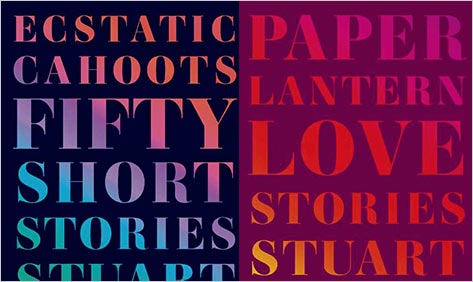Stuart Dybek Takes Flash Fiction To New Poetic Levels In His Latest Works
By Jaclyn Bauer in Arts & Entertainment on Aug 25, 2014 3:20PM
 Stuart Dybek’s latest works of art Paper Lantern: Love Stories and Ecstatic Cahoots: Fifty Short Stories were simultaneously published this year by Farrar, Straus and Giroux. Most of Dybek’s previous work is notorious for holding the qualities of a switchback highway zigzagging up a mountain. His plot lines and thought processes are constantly shifting, accelerating his narratives into a progressive crescendo of combustible intrigue and action. These collections are by no means exceptions.
Stuart Dybek’s latest works of art Paper Lantern: Love Stories and Ecstatic Cahoots: Fifty Short Stories were simultaneously published this year by Farrar, Straus and Giroux. Most of Dybek’s previous work is notorious for holding the qualities of a switchback highway zigzagging up a mountain. His plot lines and thought processes are constantly shifting, accelerating his narratives into a progressive crescendo of combustible intrigue and action. These collections are by no means exceptions.
Paper Lantern, a requiem for love, is an amalgamation of previously and separately published pieces that at times seem unrelated to love entirely. These stories are oozing with horror and sexual deviance, not to mention imbued with despair, fleeting emotions and pervasive notions of impermanence. What is so refreshing about this collection is that Dybek’s perspective is anything but a myopic view of love. With truck chases on highways, scandalous affairs and of course heated sexual encounters, Dybek holds true to the grit and glamor with which he has always permeated the page.
Ecstatic Cahoots: Fifty Short Stories resembles the work of Paper Lantern both in content and form. With characterizations of the passionate seeking, love, joy and adventure, Dybek captures the soul of his characters in surprisingly short bursts of words. Some of the stories in Ecstatic Cahoots are no more than two lines, while others are longer narratives which investigate plot points more intensely. Nonetheless, despite the length of any one story, all of Dybek’s works are captive in their telling and poetic in their delivery.
Dybek, a Chicago native, often places his characters and stories within the Chicagoland area referencing not only major landmarks such as Wrigley Field, but lesser known places too, like certain L train stations. Though many of Dybek’s characters reside in the same general setting, their thought patterns, mannerisms, obsessions, rationality, gender and morals vary from character to character.
Dybek has the ability to access situations, setting and ideologies otherwise considered perverse, and imbues them with a greater sense of relatability, accessibility and humanity. Whether it is murder, larceny, adultery or love sickness, Dybek is able to bring an overarching beauty and sense of humanity to his subjects which are difficult to escape despite their sometimes outrageous behaviors.